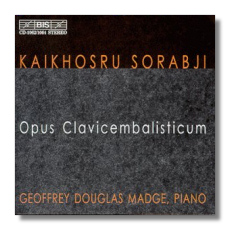
The Internet's Premier Classical Music Source
Related Links
- Latest Reviews
- More Reviews
-
By Composer
-
Collections
DVD & Blu-ray
Books
Concert Reviews
Articles/Interviews
Software
Audio
Search Amazon
Recommended Links
Site News
 CD Review
CD Review
Kaikhosru Sorabji

Op. Clavicembalisticum
Geoffrey Madge, piano
BIS CD-1062/1064 5 CDs
Along with Conlon Nancarrow's Studies for Player Piano, Kaikhosru Sorabji's Op. Clavicembalisticum is one of the 20th Century's longest piano works. At almost four hours, it is certainly the longest single work that a human can play. Sorabji played it himself for the first and last time in 1930, dedicating it "to the everlasting glory of those few men blessed and sanctified in the curses and execrations of those many whose praise is eternal damnation."
The work consists of 12 movements evolving around a theme with 44 variations and a passacaglia with 81 variations. It is, as Nicholas Slonimsky says, "a brobdingnagian masterpiece by the supreme British Parsi individualist." Its fugues are fantastically complex and its harmonies, in Sorabji's words, "bite like nitric acid." It is a daunting work to listen to, but listen you must, not over a week's time, but ideally in one evening. (If that is impossible, try breaking it up into no more than two evenings.) This work of pristine counterpoint and arcane structures has its own type of drama, one not built on jarring contrasts or abrupt tempo changes but on an astounding variety of tempo and textures, voluminous rhythmic combinations and ornamentation, all of which are introduced to the listener at Sorabji's unique pace. His compositional components change not over sharp gaps in time, but through graduated gulfs. As Gertrude Stein said of writing – that paragraphs are emotional and sentences aren't – applies to Sorabji's music monuments. Think of a kaleidoscope slowly revolving on a pedestal, slower than human fingers can turn it. What you see an hour later, bears some resemblance to the original, but with different colors, different shard shapes. It is easier to remember the experience of this music than to analyze it while listening.
This recording of Australian pianist Geoffrey Madge's performance in Chicago was the American debut in 1983. It is an astounding interpretation, less idiosyncratic than John Ogden's perhaps, but one performed with grace, muscularity, and above all, extraordinary patience and care.
Copyright © 2001, Peter Bates


















